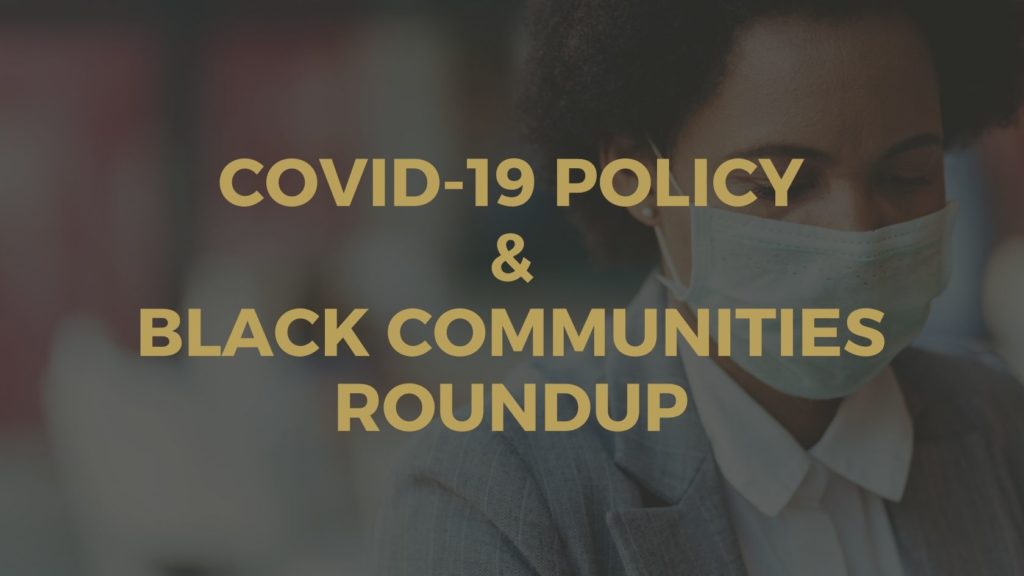
October 21 COVID-19 Policy & Black Communities Roundup
Senate Majority Leader Discourages
White House From Making Stimulus Deal
with House Speaker
House Speaker Nancy Pelosi and the White House continue to negotiate for another stimulus of roughly $2 trillion, even as Senate Majority Leader Mitch McConnell privately discouraged the White House from striking a deal. Senate Republicans warned that any deal could divide the party and disrupt plans to confirm Supreme Court nominee Amy Coney Barrett.
Today, Senate Democrats prevented Senate Republicans from passing a $500 billion coronavirus relief package. The measure fell 9 votes short of the 60 votes needed for passage. The package, which was similar to one blocked by Democrats in September, included a new round of stimulus checks, additional Paycheck Protection Program funding, financial aid to schools, and funding for testing and tracing. The proposal was part of a larger effort by Leader McConnell to press the GOP agenda, including scheduling an Oct. 22 Judiciary Committee vote to bring the nomination of Amy Coney Barrett to the Supreme Court to the Senate floor, ahead of the general election.
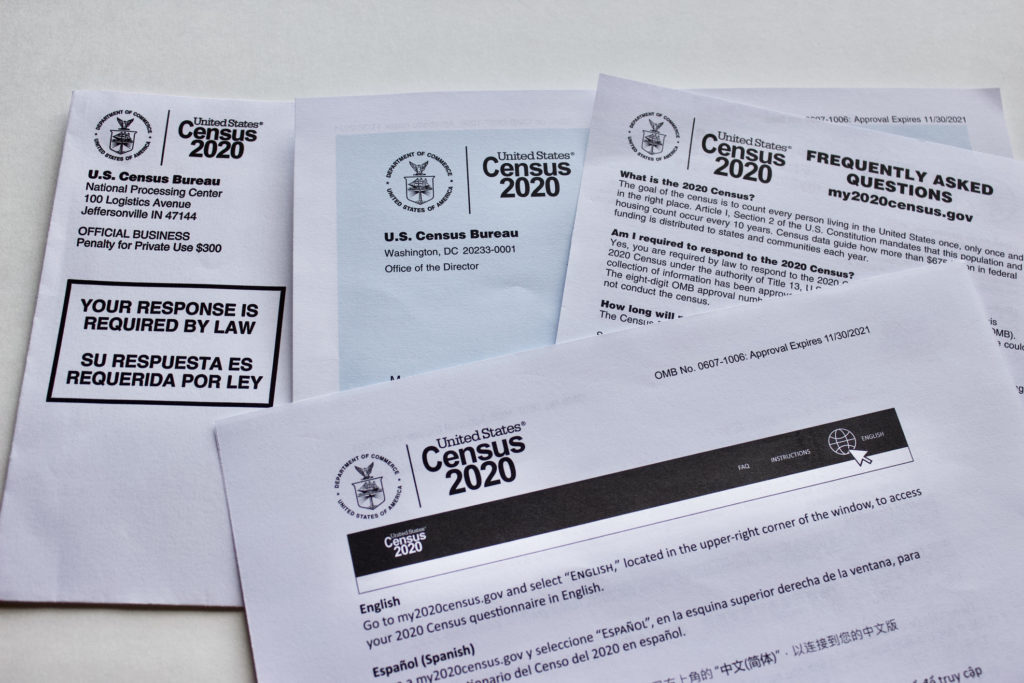
Supreme Court nominee Barrett signaled in testimony before the Senate Judiciary Committee that the individual mandate of the Affordable Care Act (ACA) could be struck down without eliminating the ACA entirely. The Supreme Court is slated to hear oral arguments in a case expected to determine the fate of the ACA, California v. Texas, on Nov. 10.
Executive Branch News
One hundred House Democrats sent a letter to Secretary of State Mike Pompeo and Health and Human Services Secretary Alex Azar criticizing the White House’s unilateral response to the COVID-19 pandemic and offering a plan to deal with the virus and work with other countries to ensure the rapid and broad availability of a vaccine. An effort by the White House to rebrand the emergency authorization of a coronavirus vaccine was resisted by the FDA. The FDA expressed concerns that the appearance of politicization of the approval process would undermine public confidence in the vaccine.
The Supreme Court issued an order allowing the Trump Administration to end U.S. Census field operations, reversing a lower court order to extend the deadline to October 31 due to the global pandemic. In her dissent, Supreme Court Justice Sonia Sotomayor wrote, “[t]he harms caused by rushing this year’s census count are irreparable. And respondents will suffer their lasting impact for at least the next 10 years.”
Federal Communications Commission Chairman Ajit Pai announced that the commission intends to regulate social media platforms such as Facebook and Twitter in line with an executive order issued by President Trump, and in response to social media companies’ efforts to fact-check and censure misinformation about mail-in ballots, COVID-19, and other content shared on its platforms. In his statement, Pai affirmed, “[Social media companies] do not have a First Amendment right to a special immunity denied to other media outlets, such as newspapers and broadcasters.” Commissioner Geoffrey Starks responded that the President’s Executive Order “was politically motivated and legally unsound.” The Joint Center filed comments with the FCC opposing the Trump Administration’s proposed revisions to Section 230 in September, and testified on the issue before Congress on October 6.
Economic Studies & COVID-19
Unemployment claims spiked to 898,000 for the week ending October 10. This is up from the revised total of 845,000 claims filed the previous week, and still significantly higher than the pre-coronavirus record high in 1982 of 695,000 claims filed in a single week.
The Economic Policy Institute (EPI) continues to urge Congress to pass more stimulus packages, noting the widening of the racial wealth gap as unemployment claims remain high. Including the 373,000 Pandemic Unemployment Assistance (PUA) claims (for gig or freelance workers who are not generally eligible for traditional unemployment insurance), 1.3 million people filed for unemployment, according to the most recent data. In studying unemployment rates for workers ages 16 to 24, EPI finds that 29.6% of young Black workers were unemployed in Spring 2020, compared to 24.4% of all workers in that age range. In analyzing data from the Bureau of Labor Statistics that shows there were 10.7 million fewer jobs in September than February, EPI concludes that providing additional state and local aid and reinstituting the $600 federal unemployment benefit supplement could increase job growth by over 10 million jobs through the next year.
A report released by The Century Foundation, the National Employment Law Project, and Philadelphia Legal Assistance, “Centering Workers: How to Modernize Unemployment Insurance Technology,” finds that “Black and Latinx workers are particularly poorly served by unemployment insurance systems,” and offers these six recommendations for states to expand and modernize access to benefits during the pandemic: 1) provide 24/7 access to online and mobile services for unemployed workers; 2) mobile-optimize unemployment websites and applications; 3) update password reset protocols; 4) use call-back and chat technology; 5) adopt a triage business model for call centers; and, 6) comply with civil rights laws requiring that websites and applications be translated into Spanish and other commonly spoken languages.
RAND Corporation Economist Kathryn Edwards argues that the unemployment insurance system is structurally racist and points to the disparity in benefits available between Black and white Americans, especially in the South.
Noting that COVID-19 has exacerbated existing conditions, a Brookings Institution analysis of the 2018 American Community survey shows that “[t]he share of workers earning low wages is higher among Black women (54%) and Hispanic or Latina women (64%) than among white women (40%), reflecting the structural racism that has limited options in education, housing, and employment for people of color.” To improve working conditions for women, Brookings Institution recommends several policy solutions that include making work more accessible for mothers and fairer compensation for women.
Two new studies show that millions of people have fallen into poverty since the expiration of the coronavirus stimulus; the new data shows Black people are more than twice as likely to be poor than white people.
The Urban Institute explores the use of Temporary Assistance for Needy Families (TANF) funds at the federal level to provide rental and eviction assistance to states and local municipalities. Citing previous research, the Urban Institute notes that “[s]tates with larger Black populations have less generous and more restrictive TANF policies, including shorter time limits, more severe sanctions, and lower benefit amounts.”
The Brennan Center for Justice concludes that certain real estate companies used campaign donations to “push policies that advance their own interests at the expense of communities of color.” According to the author, campaign donations from wealthy real estate investors explains why the CARES Act includes expanded tax cuts for wealthy investors but doesn’t do more for those facing evictions, especially Black Americans who are disproportionately affected by COVID-19 and racial disparities in housing.
To address racial inequities, JPMorgan Chase commits $30 billion toward mortgage originations & refinances, affordable rental units, and small business loans to Black and Latino communities.
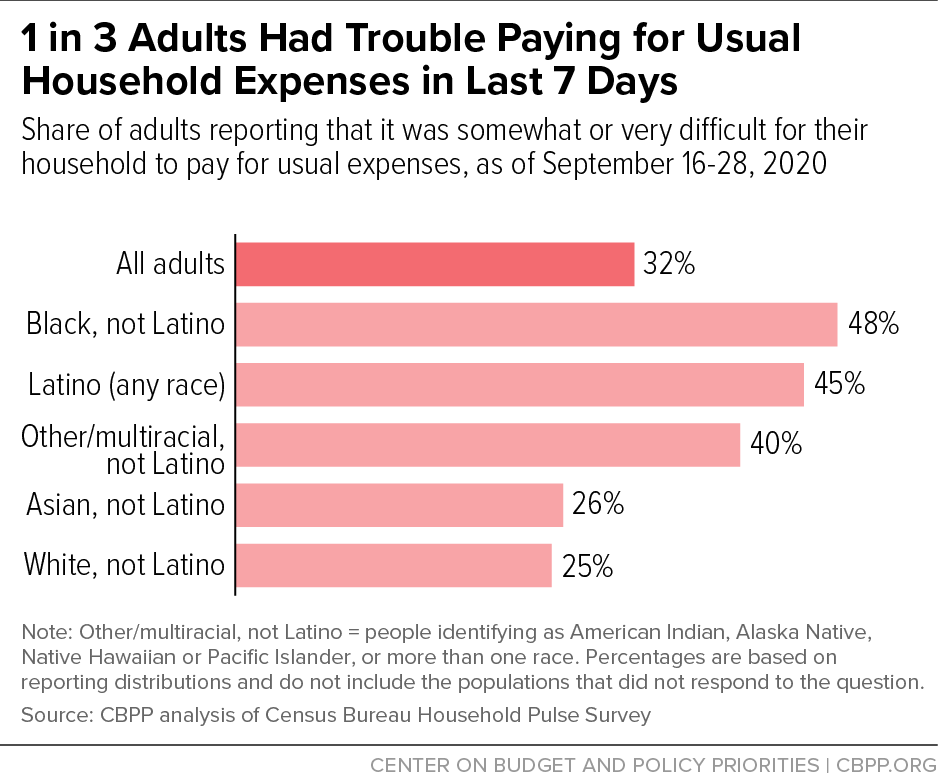
The Center on Budget and Policy Priorities urge Congress to enact a new stimulus package citing data from a Household Pulse Survey taken from September 16 to September 28 showing that “nearly half of Black (48 percent) and Latino (45 percent) adults reported difficulty paying for usual expenses, compared to 25 percent of white adults.” The survey also shows that 23% of Black renters said they were behind on rent, compared to 20% Asian, 19% Latina/o, and 10% of white renters.
One report shows that those with a net worth of at least $30 million “have already recovered much of their pre-pandemic wealth.”
The Center for American Progress advocates for federal investment in COVID-19 relief to build more equitable communities, pointing to the interconnected negative effects of the coronavirus pandemic, over-policing, climate change, and systemic racism on Black people and other people of color.
The Center for American Progress calls for the creation of a postal banking system as a means of dealing with structural inequality and the exclusion of African Americans from established U.S. financial systems. According to a 2017 FDIC survey, 16.9% of Black households were unbanked, and 30.4% were underbanked. Only 45.8% of Black households were fully-banked, the lowest of the demographic groups surveyed.
Political Studies & COVID-19
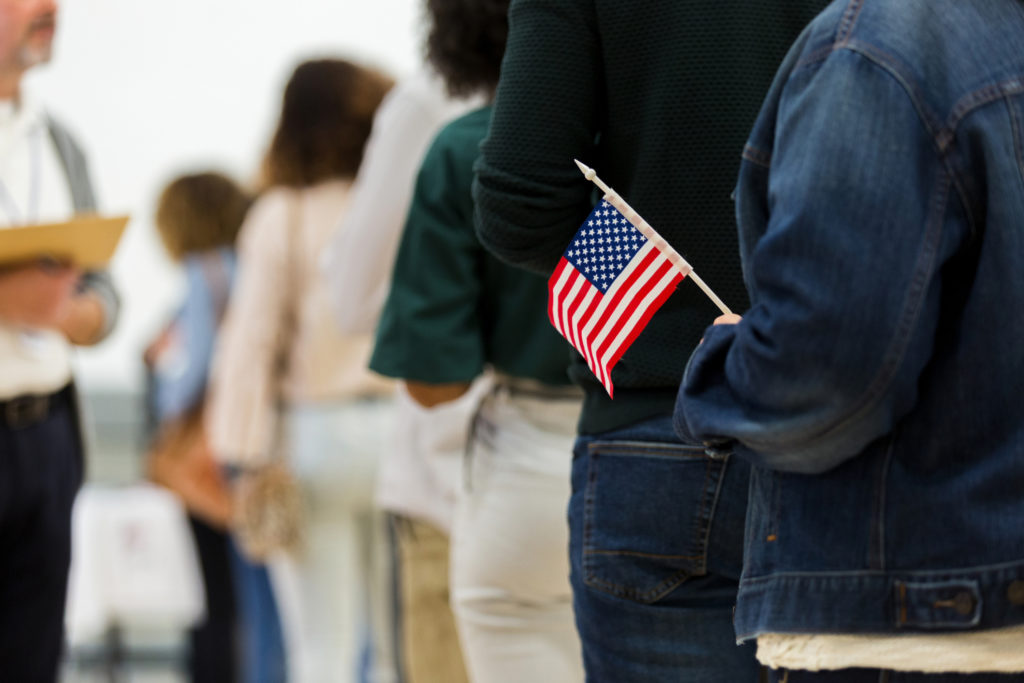
NAACP President and CEO Derrick Johnson penned an op-ed for USA Today, stating that “there is simply too much at stake for our community not to mobilize in record numbers during the next three weeks to elect politicians who will listen to and empower Black voters.” To this end, the NAACP launched Phase 2 of their Black Voices Changes Lives effort in 10 states to encourage infrequent Black voters to turn out this year.
New strategies are being deployed to reach the Black church base, which is a traditional driver of voter turnout in Black communities. These new strategies include socially distanced transportation to the polls for early voting and on Election Day, organizing phone-banking, and canvassing the members’ homes to make certain absentee ballots are requested, received, and ultimately cast.
More than 2,700 general election ballots cast by Black voters in North Carolina are in limbo due to an unresolved dispute over a process that would allow voters to correct their mail-in ballots. Over 40% of ballots labeled as “pending” or “pending cure” are from Black voters, but Black voters make up only 16% of total ballot returns and 22% of the state’s population. The confusion is raising concerns that the mail-in votes of Black North Carolinians may ultimately be suppressed.
Mistrust of the election process and the history of voter suppression has resulted in long lines of Black early-voters at polls in Georgia, despite the risks presented by the coronavirus pandemic.
The results of an annual poll of Black women by the Black Women’s Roundtable and ESSENCE reveal that respondents overwhelmingly support (90 percent) the Biden/Harris ticket. According to the National Coalition on Black Civic Participation President and Black Women’s Roundtable Convener Melanie L. Campbell, “the disproportionate impact of the COVID-19 pandemic and the protests due to racial unrest calling for eradication of systemic/structural racism and policing & criminal justice reform across the nation are reflected in this year’s poll.”
The Root cites a national survey of Black voters by the Black Futures Lab, revealing that 81% of respondents plan to vote in the general election, with 75% saying they are “extremely likely” to do so. The poll revealed voting President Trump out of office as a primary motivation of Black voters, along with racism, discrimination, COVID-19, and the economy, as other top concerns.
ABC News reports that due to the disproportionate effect of COVID-19 on Black communities, Black voters face more barriers to casting their ballots in the general election. Black people are less likely to vote in person as a result of being sick on Election Day and are also more likely than white voters to have their mail-in ballots rejected.
A Dēmos report on barriers to universal voter registration says that current voter registration requirements disproportionately prevent Black people and other people of color from voting. Only 64% of the Black voting-eligible population is registered to vote, in comparison to 71% of the white, non-Latina/o voting-eligible population.
A report from The Hill cites changing demographics of the national electorate, including a doubling of the share of Black voters in the electorate to 9.2%, as a key factor in Democrats enjoying an early advantage over Republicans in early voting.
A national survey of eligible Black and other voters of color ages 18 to 24 by the Advancement Project reveals that the demand for racial justice is the top issue mobilizing young voters to the polls. Twenty-five percent of the voters surveyed said they’d participated in a protest.
A JSTOR Daily article reports on the conflict created by the Black Press, traditionally relied upon by Black people for credible information, receiving funding from Facebook, a platform often used to target Black voters with disinformation. Black people are more likely to post images and use hashtags on social media to support a political cause, and 80 percent of Black people view social media as an important way to bring attention to a cause.
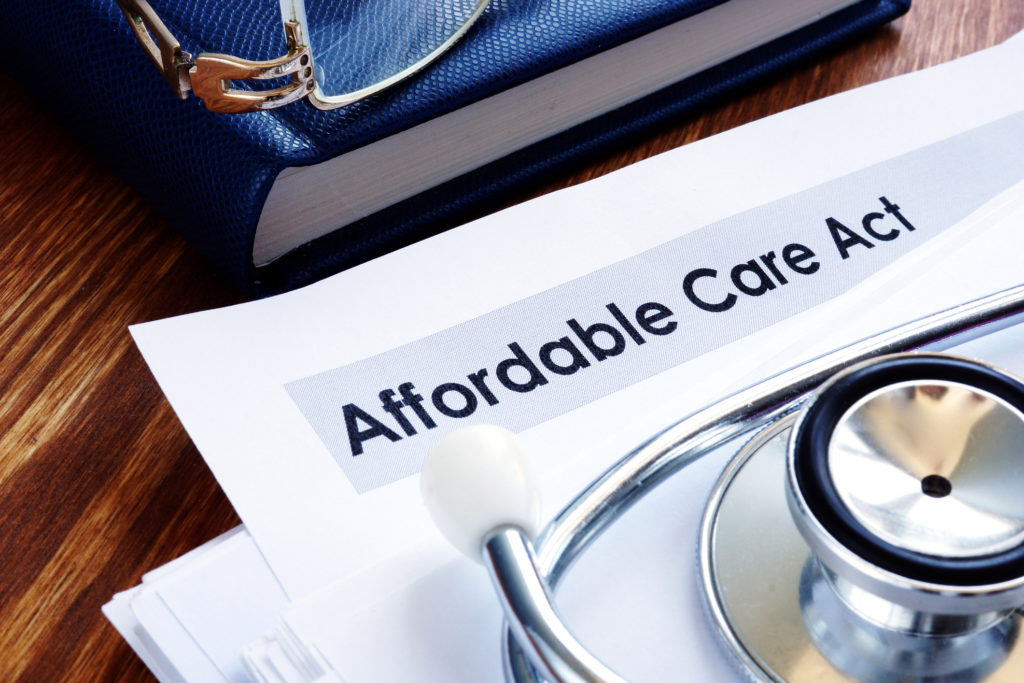
The Center for American Progress outlines the effect of the elimination of the Affordable Care Act by the U.S. Supreme Court, in the case of California v. Texas, slated for oral arguments on November 10. Among the consequences are Black people, who are 2.6 times more likely to contract coronavirus than non-Latina/o white people, losing coverage for preexisting conditions if the ACA is struck down by the High Court.
The Hill reports that the history of Black people being abused and mistreated by the American medical industry is a major obstacle to recruiting Black people for clinical trials of a potential coronavirus vaccine and to getting them to use the vaccine if one is approved. In a survey conducted by the Kaiser Family Foundation and The Undefeated, only 50% of Black adults said they would probably or definitely take a coronavirus vaccine if it was determined safe by scientists and available for free. The New York Times reports on the challenges of overcoming the mistrust of vaccines by Black people, who are more vulnerable to hospitalization and death due to the coronavirus. The article cites Pew Research survey findings showing only 32% of Black people surveyed were likely to take a coronavirus vaccine should it become available, compared to 52% of white respondents.
A Washington Post article likens President Trump’s indifference to the severity of COVID-19 to a time in the early 19th century when Black slaves in the rural South fell vulnerable to the cholera epidemic.
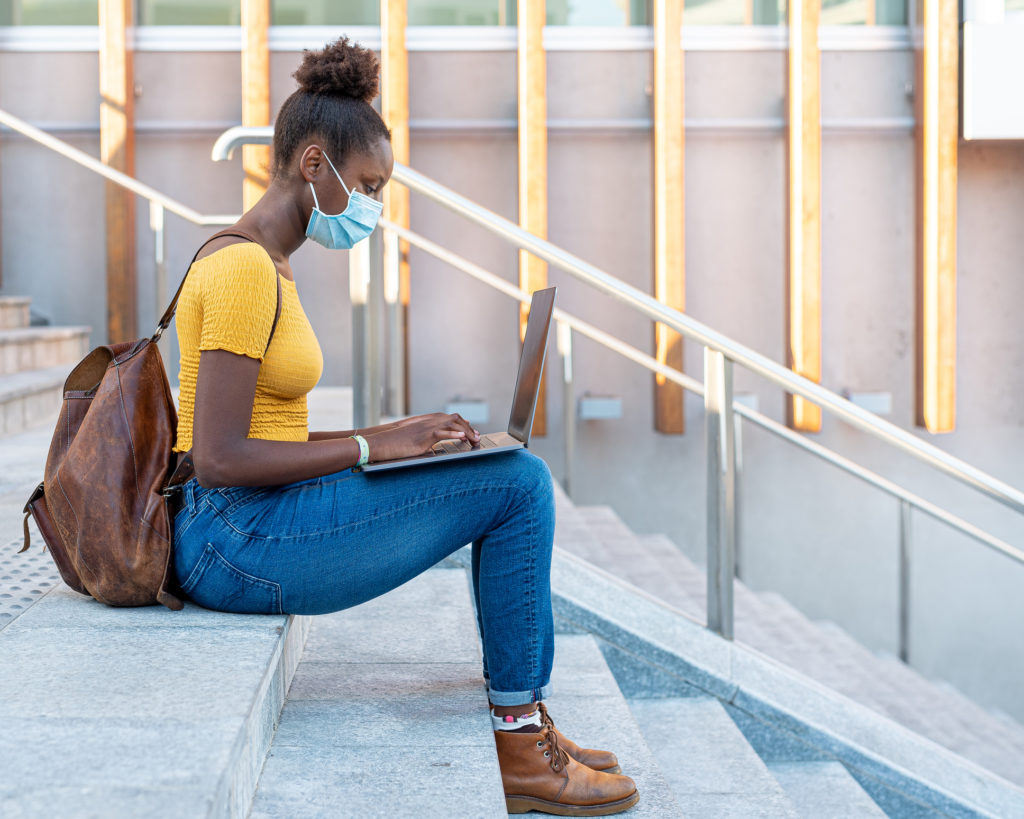
Homelessness, food insecurity, and lack of Wi-Fi access made it increasingly difficult for low-income students to pursue a college education, underscoring an overall trend of falling college enrollment during the pandemic. Almost 60% of students attending Historically Black Colleges and Universities (HBCUs) are low-income and first-generation, and more than 70% have limited financial resources.
In light of Black Americans experiencing the highest mortality rate due to COVID-19 (97.9 deaths per 100,000) in the nation, eight HBCUs, including the Howard University College of Medicine, Morehouse Medical School, and Meharry Medical College, received $25 million in diagnostic instruments and test kits.
In a six-part series, USA Today takes a look at the history of systemic racism, including food deserts, education inequality, and environmental policies, as a fundamental driver of disproportionately high rates of COVID-19 fatalities among Black people and other people of color. The largely-Black community of Reserve, Louisiana is profiled as an example of how redlining and other forms of housing discrimination have resulted in high death rates as a result of environmental racism. The local Parish, which includes Reserve, ranks among the top 30 counties with the highest COVID-19 death rates, nearly double that of the entire state of Louisiana. Reserve is surrounded by chemical plants and has the highest cancer risk in the nation. Almost 60% of African Americans said they trust the nation’s health care system only some, or almost none, of the time to do what is right for their communities.
Citing previous studies showing that 31% of Black households do not have high-speed home broadband, National Urban League Tech Fellow Danielle Davis advocates for an Emergency Broadband Benefit that would allow qualifying families to receive subsidies to purchase broadband services.
The Brookings Institution fact-checks President Trump’s repeated claim of having done more for African Americans than any president since Abraham Lincoln. Brookings evaluates President Trump’s record in areas including policing and criminal justice reforms, coronavirus relief for Black businesses, President Trump’s Platinum Plan for Black-owned businesses, and access to affordable health care during the pandemic.
Against the backdrop of high-profile cases of police violence and a national reckoning on racial justice, Pew Research findings show that Black people hold issues of race as a higher priority for changing public policy than white people. While 86% of Black respondents believe that America has not gone far enough to provide equal rights to Black people (up from 78% in 2019), only 49% of all adults (up from 45% in 2019) agree that America has not gone far enough.
Movement Building
NAACP Legal Defense and Educational Fund, Inc. (LDF) launches the “They Can’t. We Can.” voting campaign to honor victims of police violence and others whose lives were senselessly taken in racially-motivated crimes, and encourage voters to vote in their honor.
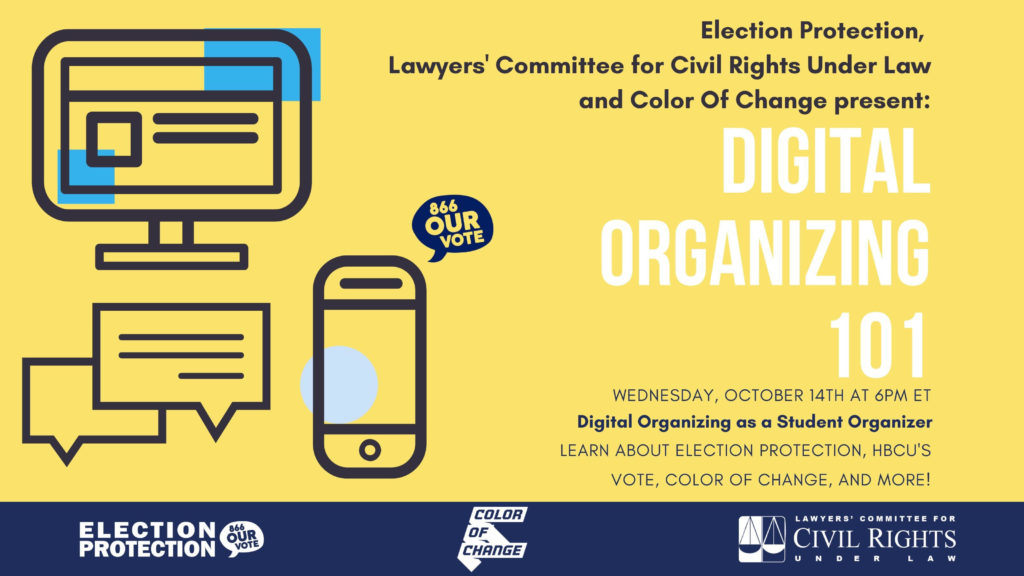
Color of Change, Election Protection, and Lawyers Committee for Civil Rights Under Law host a Digital Organizing 101 webinar on how to mobilize young voters and partner with student voting advocacy organizations at HBCUs and in other spaces.
The Leadership Conference on Civil and Human Rights, and more than 400 state and local elected officials release a letter to the U.S. Senate “demanding action on the urgent issues of the pandemic and economic crisis and for an end to the confirmation process of a new justice to the U.S. Supreme Court until after Inauguration Day.”
Black Voters Matter’s BVM caravan travels to Lafayette, Louisiana to inform voters about early voting.
Events
Upcoming events include “Economic recovery in American cities: Building Black businesses and wealth” (Brookings Institution, October 21); “Worker Absenteeism and Food Supply Disruptions” (REMI, October 21); “Holding the U.S. Accountable for Housing, Homelessness, and Human Rights During COVID-19” (National Homelessness Law Center, October 21); “Reclaim Your Vote: What’s at Stake for Black America” (National Urban League, October 22); “Elevating Black Women-Owned Businesses” (Higher Purpose Co., October 24).
Last week, events were held by Brookings Institution, Center for American Progress, Knight Foundation, New America, Politico, The Leadership Conference on Civil and Human Rights, and WorkRise.
Podcasts
What Does COVID-19 Mean for the Future of Latino Entrepreneurship? (Urban Institute)
The Digital Divide (African American Mayors Association)
The Joint Center thanks the Annie E. Casey Foundation, the Boulé Foundation, the Democracy Fund, Toyota Motor North America, Inc., UPS, and the Walmart Foundation for additional support that has allowed us to do some of our COVID-19 and Black Communities work.

